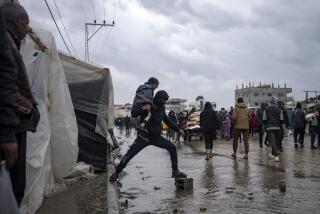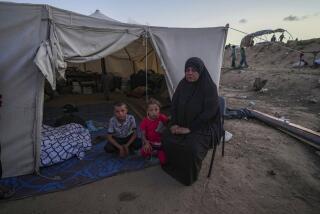Fear Returns to Border Town as U.S. Pulls Out : Iraq: Scarcely 48 hours after American troops withdrew from the south, Safwan is being pulled back under the control of Baghdad.
SAFWAN, Iraq â A freshly hung portrait of Saddam Hussein smiled down from a battle-scarred wall in this tense and desolate border town Friday as international observers pronounced the region free of military armed forces for the first time since the Persian Gulf War.
Scarcely 48 hours after U.S. troops withdrew from southern Iraq, Safwan is being pulled back under the control of Iraqi authorities. The transition is not smooth.
Shooting has been reported in the tiny town ever since American forces departed, most of it said to be the product of fighting between pro- and anti-Hussein factions. Refugees told relief workers that a group of people who went to buy food in Safwan were kidnaped; two escaped, and three are missing. Rumors are rampant that secret police are spying on a nearby refugee settlement.
Although none of the reports can be confirmed, they are symptomatic of the fear and anxiety that pervade Safwan just as a small, lightly armed U.N. peacekeeping force takes control of the border region. The U.N. mission, however, is not to enforce law and order but to make sure Iraqi and allied armies stay out of a nine-mile-deep buffer zone along the Kuwaiti-Iraqi border as part of the cease-fire agreement that concluded the Gulf War.
To that end, the United Nations on Friday formally declared that the withdrawal of troops from the demilitarized zone was âcompleted and verified.â Both Kuwait and Iraq, however, are entitled to deploy their national police, U.N. spokesman Majid Fayad said in Kuwait city. Police must wear uniforms that distinguish them from the military and will be permitted sidearms but not AK-47s, standard issue for Iraqi police.
Police are considered part of the civil administration of a country, allowed under the cease-fire. Nevertheless, some of the townspeople of Safwan said they fear reprisals from the Iraqi police because the residents accepted American food and medical care.
On Friday, the signs of Iraqi authority were returning. A picture of Hussein, dressed in a bright white military uniform with gold braid and flashing a toothy smile, appeared for the first time since American troops swept into southern Iraq in late February.
In a town where GIs for weeks doled out water and food, wall slogans that once praised the United States and vilified the âblood of Saddamâ now declare loyalty to the feared ruler: âThe People From Safwan Are With Saddam Husseinâ proclaims one graffito at the entrance to Safwan.
During a visit, the streets were nearly deserted, and barely a sound came from the bombed-out homes.
A handful of children who roamed the rutted dirt roads or sat at battered kiosks selling fruit waved at two visitors. But adult males who lounged at a taxi stand only stared icily.
âEvery night, shooting,â said the lone Kuwaiti police officer manning what passes for a border post on the road leading to Safwan.
Nearby, two Iraqi women sat dejectedly at the roadside with their luggage piled next to them. Stranded, they pulled their black cloaks tighter to protect against an irksome sandstorm whipping across the desert.
Before pulling out, the U.S. military airlifted more than 8,000 Iraqi refugees to a camp in Saudi Arabia, and Iran took another 1,900. But the border area remains a land of the desperate and displaced.
Just inside Kuwait at a place called Abdaly, a sprawling camp of about 5,000 refugees sits in the sand under heat in excess of 100 degrees.
Many are the so-called bidouns, Arabs whose families once wandered the desert and who technically hold no citizenship papers from a specific country. Kuwait has so far refused to accept the bidouns even though many lived in Kuwait for decades.
Dan Prewitt, head of the League of Red Cross and Red Crescent Societies in Kuwait, said Friday he is âguardedly optimisticâ that diplomatic efforts will resolve the bidounsâ plight. But he said he does not expect a solution for several weeks.
Prewittâs organization is coordinating care for the refugees.
The Abdaly camp has also given shelter to several Iraqi families who fled Safwan, Basra or other Iraqi towns. One man, an engineer from Basra, arrived at the border with his wife and two children the day after the last airlift left for the camp at the Saudi town of Rafha. What happens to him now is anyoneâs guess.
âWe cannot go back to Iraq. We cannot go to Kuwait. Now Rafha is gone,â he said. âWhat is our future? There must be some kind of hope.â
âWe are so frightened because there are no more U.S. forces,â said Randa Ali, an Iraqi-born resident of Anaheim, Calif., caught in Iraq--and now the camp--by the war and its turbulent aftermath.
More to Read
Sign up for Essential California
The most important California stories and recommendations in your inbox every morning.
You may occasionally receive promotional content from the Los Angeles Times.











